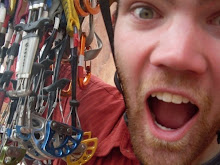
I decided this week to devatate from my normal topic of experiential education. This experience reminded me of how amazing ski mountaineering can be in the Wasatch.
This season has been far from stable. In the Wasatch Range several Persistent Weak Layers (PWL) have plagued the snow pack. A line that was over thirty degrees would be pushing the limits of stability, and any line of thirty five degrees has been suicidal. Fortunately, this past week was a welcomed change of pace. Brian Ballard, Mark, and myself set out for a high point – Mount Superior. We decided that if nothing else we would summit along the east ridge and have the ability to descend along the same route.

"Powder snow skiing is not fun. It's life, fully lived, life lived in a blaze of reality."
-Dolores LaChapelle
The north east aspect was our line of descent. Fortunately, the snow pack was stable enough to ski! With the direction of wind loading over night and new snow, the stability was incredible. In fact, my primary concern was a minor amount of sluffing. The runs were incredible, with amazing powder for 1700 feet. However, stability in a snow pack changes. While our runs on Wednesday were manageable, I would strongly discourage anyone from repeating the descent – In the past several days warming and wind loading have created dangerous conditions.






